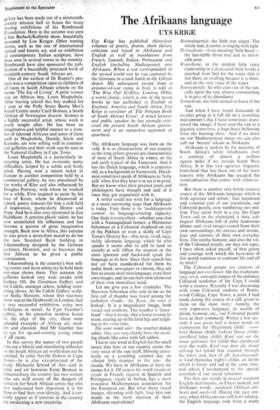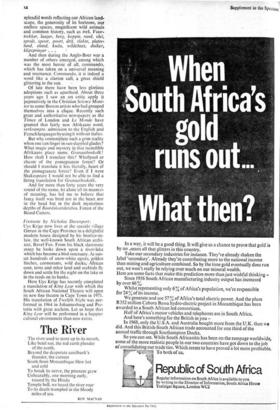The Afrikaans language
UYS KRIGE
Uys Krige has published thirty-four volumes of- poetry, drama, short stories, criticism and travel in Afrikaans and English as well as translations from French, Spanish, Italian, Portuguese and English (including Shakespeare) into Afrikaans. When a war correspondent in the second world war he was captured by the Germans in a tank battle in the Libyan desert. His subsequent escape from a prisoner-of-war camp in Italy is told in 'The Way Out' (Collins, London, 1946), a world classic, which is one of the seven books he has published in English in England, America and South Africa.- Uys Krige is co-editor of 'The Penguin Book of South African Verse'. A noted lecturer and public speaker he has strongly criti- cised the present South African govern- ment and is an outspoken opponent of apartheid.
The Afrikaans language was born on the veld. It is as characteristic of our country as the long yellow grasses are characteristic of most of South Africa in winter, or the red earth typical of the Transvaal. And it has the Dutch language, which is centuries Old, as a background or framework. Dutch- men sometimes speak of Afrikaans as 'baby talk' when first they hear it or see it in print. But we know what their greatest poets and philologists have thought and said of it once they got acquainted with it.
A writer could not wish for a language at a more interesting stage than Afrikaans is today. First there is its `taalskeppende vermoe, its language-creating capacity. One finds it everywhere—whether you chat with a Namaqualand farmer, a Hermanus fisherman or a Coloured shepherd on top of the Pakhuis or even a skolly of Cape Town's District Six—this terse, vivid, racy, richly idiomatic language which he who speaks it seems able to add to (and so enrich) at will. Often the poorest or the most ignorant and backward speak the language at its best. Since their speech has not yet been standardised for them by radio, book, newspaper or cinema, they are free to create their own language, even their own images, and invent their own idiom out of their own immediate need.
Let me give you a few examples. The Hawston fisherman who said to me as the first roll of thunder was heard among the
turbulent clouds : Basie, die weer is loskop'. It is a magnificent image, both visual and auditory. The weather is 'loose- head'—that is to say, like a horse tossing its mane, rearing up on his hind legs and neigh- ing at the same time.
Die weer maak uier: the weather makes udder. One sees very clearly here, the swell- ing clouds like cows with full udders.
I know one word in English for the small insect that here in our country seems the very voice of the sun itself,..blowing cease- lessly on a scorching summer day its vibrant little trumpet to the sun : the cicada. We have in Afrikaans at least six names for it. Of course the word cicada or cigale in French, cigarra in Spanish and Portuguese, cigala in Italian, has a most evocative Mediterranean association for the European ear. But what sharp visual images, shivering with light, leap into our minds at the mere mention of their Afrikaans equivalents! Boomsingerdie, the little tree singer. The whole tree, it seems, is singing with light.
Doringbesie—besie meaning 'little beast'— the inevitable thorn tree and its inevit- able poet.
Waterbesie, or the strident little voice clamouring in a desiccated bush beside a parched river bed for the water that is not there, or exulting because it is there. and so the very voice of the water.
Sunroepertjie. he who cries out of the sun, calls upon the sun, almost commanding it to give of its abundance.
Sonnebesie, the little animal or beast of the sun. - And when I have heard thousands of cicadas going at it full tilt on a scorching midsummer's day 1 have sometimes trans- posed the image; 1 have seen the sun as a gigantic sonnebees. a huge beast bellowing from the burning skies. And if we insist on our Mediterranean image we can also call our 'beastie' sikada in Afrikaans.
Afrikaans is spoken by the majority of South Africa's white inhabitants over a . territory of almost a million square miles if we include South West Africa. It is this vast agrarian linguistic hinterland that has been one of the main reasons why Afrikaans has escaped the standardisation that comes with urbanisa- tion.
But there is another very fertile creative source of the Afrikaans language which is both agrarian and urban : that important and essential part of our population, our Coloured people, now numbering two mil- lion. They speak both in a city like Cape Town and on the platteland. a slaty, col- loquial Afrikaans full of pithy humorous idioms and vivid images coined from their own surroundings, the stresses and strains, joys and sorrows of their own everyday lives. The earthy humour, and also the wit, of the Coloured people, are they not signs, I have often asked myself, of that gaiety and courage with which the have-nots of this world continue to confront life and all its trials?
The Coloured people are creators of language par excellence. On the exuberant, racy, terse, untaught tongue of the ordinary Coloured workman of the Cape I could write a treatise. Recently 1 was discussing with some Coloured students of Battis- wood College, Cape Town, a point 1 had made during the course of a talk given to them on the short story: namely, the very expressive language, its wealth of idiom, humour, etc., our Coloured people have at their command. Within a few sec- onds I was given half a dozen words or expressions for 'illegitimate child': voor- kind (before child): loskind (loose child); speelkind (play child): Kind wat oor die muur geklouter het (child that clambered over the wall); Kind wat deur die draad gekruip het (child that crawled through the wire): and, best of all. Saterdagaatuf- se kind (Saturday night's child), an idiom which is funny and sad at the same time, and which I recommend to the special attention of our social reformers.
The first two words in several standard English dictionaries, so I have noticed, are Afrikaans words : aardvark (African ant- bear) and aardivolf. During the past cen- tury, when Afrikaans was still in its infancy, the English language took from it many splendid words reflecting our African land- scape, the generosity of its horizons, our endless spaces, magnificent wild animals and common history, such as trek, Voor- trekker, laager, berg, koppie, rand, vlei, spruit, spoor, poort, drif, vlakte, platte, land, eland, kudu, wildebees, duiker, klipspringer . . .
And then during the Anglo-Boer war a number of others emerged, among which was the most heroic of all, commando, which has taken on a universal meaning and resonance. Commando, it is indeed a word like a clarion call, a great shield glittering in the sun. • Of late there have been less glorious adoptions such as apartheid. About three years ago I saw an art critic apply it pejoratively in the Christian Science Moni- tor to some Boston artists who had grouped themselves into a clique. Recently such great and authoritative newspapers as the Times of London and Le Monde have granted that fairly new Afrikaans word, verkrampte, admission to the English and French languages by using it without italics.
But why contemplate such a grim reality when one can linger in sun-dappled glades? What magic and mystery in that incredible Afrikaans place name, Granaatboskolk! How shall I translate this? Whirlpool or chasm of the pomegranate forest? Or should I translate it less literally, heart of the pomegranate forest? Even if I were Shakespeare I would not be able to find a fitting translation for Granaatboskolk. And for more than forty years the very sound of the name, let alone all its nuances of meaning, has led me to believe that fancy itself was bred not in the heart nor in the head but in the dark mysterious depths of Baardskeerdersbos, Forest of the Beard Cutters.
Footnote by Nicholas Davenport: Uys Krige now lives at the seaside village Onrust in the Cape Province in a delightful modern house designed by his brother-in- law, the well-known South African archi- tect, Revel Fox. From his black slatestone stoep he looks down upon a river-lake which has become a bird sanctuary. At sun- set hundreds of snow-white egrets, golden finches, cormorants, wild ducks; African coot, terns and other land and seabirds fly down and settle for the night on the lake or in the reeds on its banks.
Here Uys Krige has recently completed a translation of King Lear with which the South African National Theatre will open its new fine theatre in Cape Town in 1971. His translation of Twelfth Night was per- formed in 1964 in Johannesburg and Pre- toria with great acclaim. Let us hope that King Lear will be performed in a happier cultural environment than now exists.























































 Previous page
Previous page